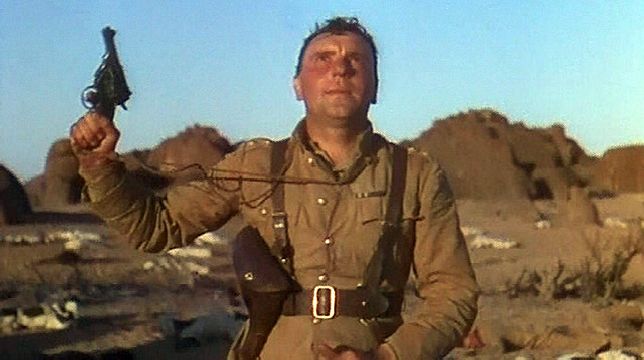The Four Feathers (1939) 
“See…The Dreaded Dervishes! – Kipling’s Famous FUZZY WUZZIES!”

Director: Zoltan Korda
Cast: John Clements, Ralph Richardson, C. Aubrey Smith
Synopsis: A British army officer who resigns his commission on the eve of his unit’s embarkation to a mission against Egyptian rebels seeks to redeem his cowardice by secretly aiding his former comrades disguised as an Arab.
In April 1939, with Britain fearing it was drawing ever closer to a war with Hitler’s Germany, Anglophile emigre Alexander Korda released The Four Feathers, an epic blood and thunder adaptation of A. E. W. Mason’s Victorian novel. The film was a subtle call to arms which might have passed over the heads of many of its contemporary audiences, thanks largely to a focus on Boy’s Own Adventure which, for the most part, glosses over the subtexts of the conflict between personal beliefs and societal traditions and codes of honour. Today, The Four Feathers provides a looking glass into the past and a way of life that was already in decline back in 1939, a fact hinted at by subtle suggestions that the idea of an Empire to be defended and regained at all costs had become outdated in the thirty odd years since Mason‘s novel first appeared.
John Clements plays Harry Faversham, a young man born into a military family who, as a child, suffered the suspicions of his father (Allan Jeayes) that he was a coward because of his sensitivity and fondness for poetry. Joining the regiment out of a misguided sense of duty, Harry resigns his commission on the eve of his regiment’s departure for Egypt to fight the Dervishes and their mates, the fuzzie-wuzzies, a decision which prompts his three best friends to issue him with a white feather each. The feathers are a symbol of both Harry‘s cowardice and their subsequent contempt for him. To make matters worse, Harry‘s fiance Ethne (June Duprez), while understanding and sympathising with his principles, rejects him because she believes his sense of duty must come first.
Stung by his friends’ contempt for him, Harry determines he must overcome his cowardice – or, more accurately, his fear that he might prove to be a coward when tested on the battlefield – and prove them all wrong in order to clear his name. He embarks to Egypt and, disguising himself as a member of a tribe whose members have all had their tongues removed, sets about coming to the rescue of his beleaguered former friends.
The message here seems to be that that it was possible for a person to serve one’s country while remaining true to their principles, and that fears that one wouldn’t measure up in the heat of battle were both natural, and likely to be unfounded. Either way, it’s of secondary interest to the Boy’s Own aspect of the story which takes centre stage for most of the running time. Director Zoltan Korda fills the Technicolour screen with breathtaking images of Egypt, and stages massive battle scenes which would keep cropping up in similarly located movies for years to come. Ralph Richardson, giving a memorable performance as one of Harry’s former friends, goes blind in the sun, while Jack Allen and Donald Gray, as Harry’s two other friends, find themselves grabbed by the fuzzie-wuzzies – not a pleasant prospect in anybody’s book. John Clements delivers a painfully stilted performance as the repressed Harry Faversham, but is far more convincing in the guise of a mentally damaged native.
The Four Feathers provides some rousing old fashioned entertainment, but is of an age that has long passed and has little relevance to today’s world, a fact supported by the box office failure of the 2002 remake.
(Reviewed 18th June 2012)
httpv://www.youtube.com/watch?v=hyyDByrFZ3U
